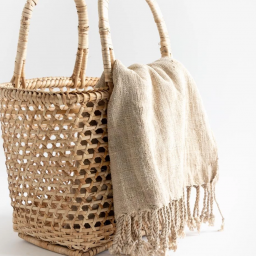Luxurious Lotus Silk
Lotus fibre or lotus silk is a rather rare and exclusive fibre. The silk comes from the stem of the lotus flower which is made up of microfibres.
The stems are snapped off, the fibres are teased out before being rolled into thread. Once the threads are dry, they are weighed down and carefully wound by hand. Then they’re put onto the loom. These fibres are fragile, but once woven, can be as durable as traditional silk.
The entire process of fibre extraction, weaving the fibre, and making the fabric is completely handmade, making the process time-consuming. This also limits the quantity of the fabric produced. A large scarf requires the thread of around 9,200 stems and would take one worker around two months to complete. This is why it is considered luxurious and items made from lotus silk do not go cheap.
The resulting material resembles raw silk or an aged linen, naturally beige in colour and possesses unique qualities. It is waterproof, practically wrinkle proof, washable, lightweight, sweatproof and is soft to the touch.
Most importantly, its key quality is that it is one of the most eco-friendly materials on the planet. The lotus is a water plant. It preserves the eco-system in which it grows including the water as much as the surrounding wildlife.
Not only is it created from waste (lotus stems), but it also leaves little waste behind. In fact, lotus silk been identified as potentially the most ecological fabric in the world, and it is the first natural microfibre in the world. Being a natural fibre, it is biodegradable after its useful life.
Poll: Do you think banning gang patches is reasonable?
With the government cracking down on gangs, it is now illegal for gang members to display their insignia in public places whether through clothing or their property.
This means arrests can be made if these patches are worn in places like restaurants, shops, on public transport or ferries, and on airplanes. Arrests were made recently at a funeral.
Do you think this ban is reasonable?

-
0% Yes
-
0% No
-
0% Other - I'll share below
Poll: Should all neighbours have to contribute to improvements?
An Auckland court has ruled a woman doesn’t have to contribute towards the cost of fixing a driveway she shares with 10 neighbours.
When thinking about fences, driveways or tree felling, for example, do you think all neighbours should have to pay if the improvements directly benefit them?

-
82.1% Yes
-
15.1% No
-
2.7% Other - I'll share below
Cupboards of calm
Transform the inside of your humble storage spaces with Resene paint and you’ll be happy to delve into them in future.
Get our quick tips to transform your storage spaces.










 Loading…
Loading…




















